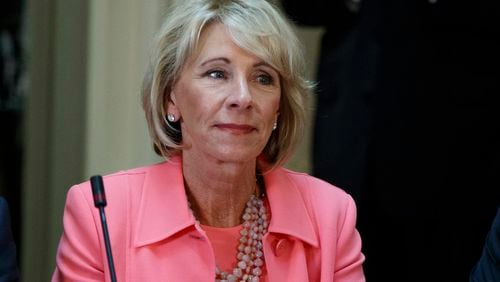U.S. Secretary of Education Betsy DeVos didn't have a hectic schedule this week, but that didn't stop her from declining to address the more than 300 journalists three miles down the road at the Education Writers Association National Seminar. Her Wednesday schedule showed a meeting with the president of the National Institute for Automotive Service Excellence and a phone chat with her Mexican counterpart.
Prior education secretaries made a point to attend the annual gathering of the print, radio and TV reporters who cover schools and education policy. (DeVos' predecessor John King will return today to the EWA event to discuss disparities in school funding.)
Those previous ed secretaries didn't spark a political battle so heated that confirmation required an unprecedented tie-breaking vote by the vice president. Unlike DeVos, other secretaries weren't blocked by protesters in their first official visit to a K-12 public school or met with turned backs at their first commencement speech.
Since she assumed the post in February, DeVos has rebuffed one-on-one interviews with reporters. She probably wasn't keen on joining a fleet of them --- including me and two other Atlanta Journal-Constitution journalists -- on the nearby Georgetown University campus. Apparently, a free tote bag and EWA water bottle didn't sway her, either.
Despite her absence at the seminar, DeVos merited a fair amount of attention from guest speakers, mostly around her push to expand school choice and vouchers.
"The question being posed by the DeVos/Trump administration is whether public education is a public good anymore and the foundation to a democracy," said American Federation of Teachers President Randi Weingarten. "Or is it a commodity that can be bought and sold in an unregulated market?"
Weingarten made her remarks on a spirited panel on education politics in the era of Donald Trump and Betsy DeVos. While the conservative and liberal policy experts on the panel clashed on school choice and vouchers, they agreed Republican control of the White House and both chambers of Congress did not necessarily assure expanded choice.
"There is not overwhelming Republican support to expand school choice from Washington," said panelist Martin West, deputy director of Harvard’s Program on Education Policy and Governance.
Panelist Lindsey Burke of the Heritage Foundation explained her organization's reservations about federal choice dictates. "I spend my waking hours thinking about how to advance school choice, but is it appropriate for the federal government to be engaged in a widespread push via a new program? We have a fair amount to risk by engaging in a new, large-scale federal program when states are doing it on their own already. We see states adopting new school choice options."
Another panel delved into the proposed federal education budget and what it implied about the White House's commitment to choice. During the campaign, Trump promised $20 billion to expand choice and vouchers. But the Education Innovation and Research program in his budget to study and expand private school vouchers falls short of that.
"What did surprise me was there is only $250 million set aside in this Education Innovation and Research program to fund vouchers and research into vouchers. I expected a lot more," said Samuel Abrams, director of the National Center for the Study of Privatization in Education at Teachers College, Columbia University. "I was thinking something more along the lines of Race to the Top where Obama allocated $4.35 billion in 2009."
Robert C. Enlow, president and CEO of EdChoice, said the angst over the federal education budget was overblown since federal spending represents only 9 to 11 percent of the total spent on schools.
"The reality is that when the budget goes to Congress, it is not going to withstand the pressure," said Enlow. "No budget from a president ever goes over unscathed and remains unscathed. We have a lot questions to answer about the budget. What do these proposals look like in detail? Right now we are spending a lot of time arguing about the ideology behind the proposals rather than the actual proposals themselves."
About the Author







